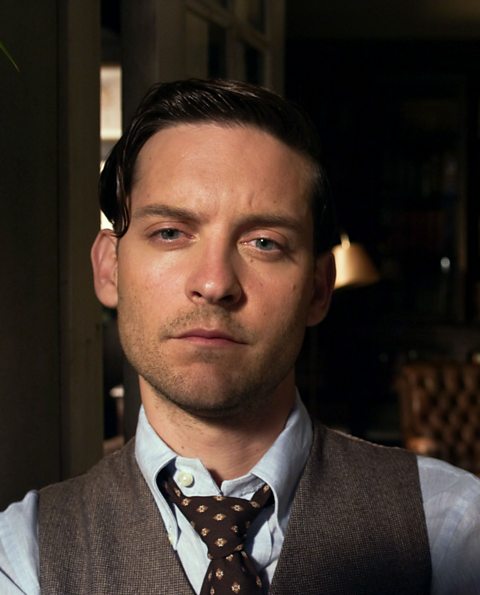First person narrative
The role of Nick Carraway

The story is told through the eyes of Nick and the first two pages of the novel are crucial to an understanding of his role. In these pages we see:
- Nick's qualities as a narrator. He is "inclined to reserve all judgements, a habit that has opened up many curious natures to me." We see many characters telling their stories to him. For instance Daisy confides in him, "I've had a very bad time, Nick, and I'm pretty cynical about everything." Similarly, in chapter two, "Myrtle pulled her chair close to mine, and suddenly her warm breath poured over me the story of her first meeting with Tom." Later, Gatsby also tells him about his past.
- The story is told retrospectiveLooking back on or dealing with past events or situations.. The book begins by telling us that Nick will end up disillusioned with the East: "I wanted no more riotous excursions with privileged glimpses into the human heart."
- Nick's overall assessment of Gatsby is given in advance of the story: "Gatsby turned out all right at the end."
Thus, although the details are not revealed, the novel begins at the end of a sequence of events which the rest of the book goes on to trace in depth.
Detachment and involvement
Nick is not only the narrator of the story; he is also a participant in it. Throughout the novel he is aware of his ambivalent status, sometimes feeling part of the action and sometimes feeling an outsider. This state of being simultaneously detached and involved is the key point about Nick's role in the book.
The clearest statement of his position comes near the end of chapter two at the gathering at the apartment in New York used by Tom and Myrtle:
âŠeach time I tried to go I became entangled in some wild, strident argument which pulled me back, as if with ropes, into my chair. . . I was within and without, simultaneously enchanted and repelled by the inexhaustible variety of life.
Nick's involvement in the action can be illustrated in many ways:
- Early on, we are told that he is related to Daisy and he had known Tom in his student days.
- He is a neighbour of Gatsby.
- He becomes involved with Jordan Baker in chapter four, even though he is fully aware of her dishonesty. "I put my arm around Jordan's golden shoulder and drew her toward me and asked her to dinner."
- Although Nick has found by chapter four that Gatsby
has little to say
, Gatsby then goes on to tell him about his past and involve him in his scheme to woo Daisy. - Nick offers him support and advice and rebukes him: "You're acting like a little boyâŠ. Daisy's sitting in there all alone."
- In chapter five Nick turns down Gatsby's offer to involve him in his business:
because the offer was obviously and tactlessly for a service to be rendered, I had no choice except to cut him off there
. - At the end of the chapter he feels detached: "[Gatsby and Daisy] had forgotten me. . . I went out of the room and down the marble steps into the rain, leaving them there together."
- In chapter six Gatsby discusses Daisy's reactions to his party and expresses his desire to 'repeat the past'.
- In the climactic confrontation in chapter seven, Nick's role is less significant: he is reduced to a bystander.
- By the time of Gatsby's funeral at the end of the book, it is clear that Nick was the only person Gatsby could rely on. "I found myself on Gatsby's side, and alone."paradoxAn idea that may contain conflicting ideas or may seem contradictory, eg 'No man that's born of woman' (Macbeth). Paradox creates intrigue or conflict., his involvement with Gatsby finally isolates him from the others.
Nick's assessment of Gatsby
A further important aspect of Nick's role is that he directs the reader's sympathies. From chapter five onwards, the closing pages of each chapter trace the development of Nick's thoughts about Gatsby's dream. In the course of these chapters, Nick's understanding of Gatsby's mind grows, and we see again Nick's ambivalent responses to him, best summed up in chapter eight when he tells Gatsby:
You're worth the whole damn bunch put together
But then adds...
I disapproved of him from beginning to end.